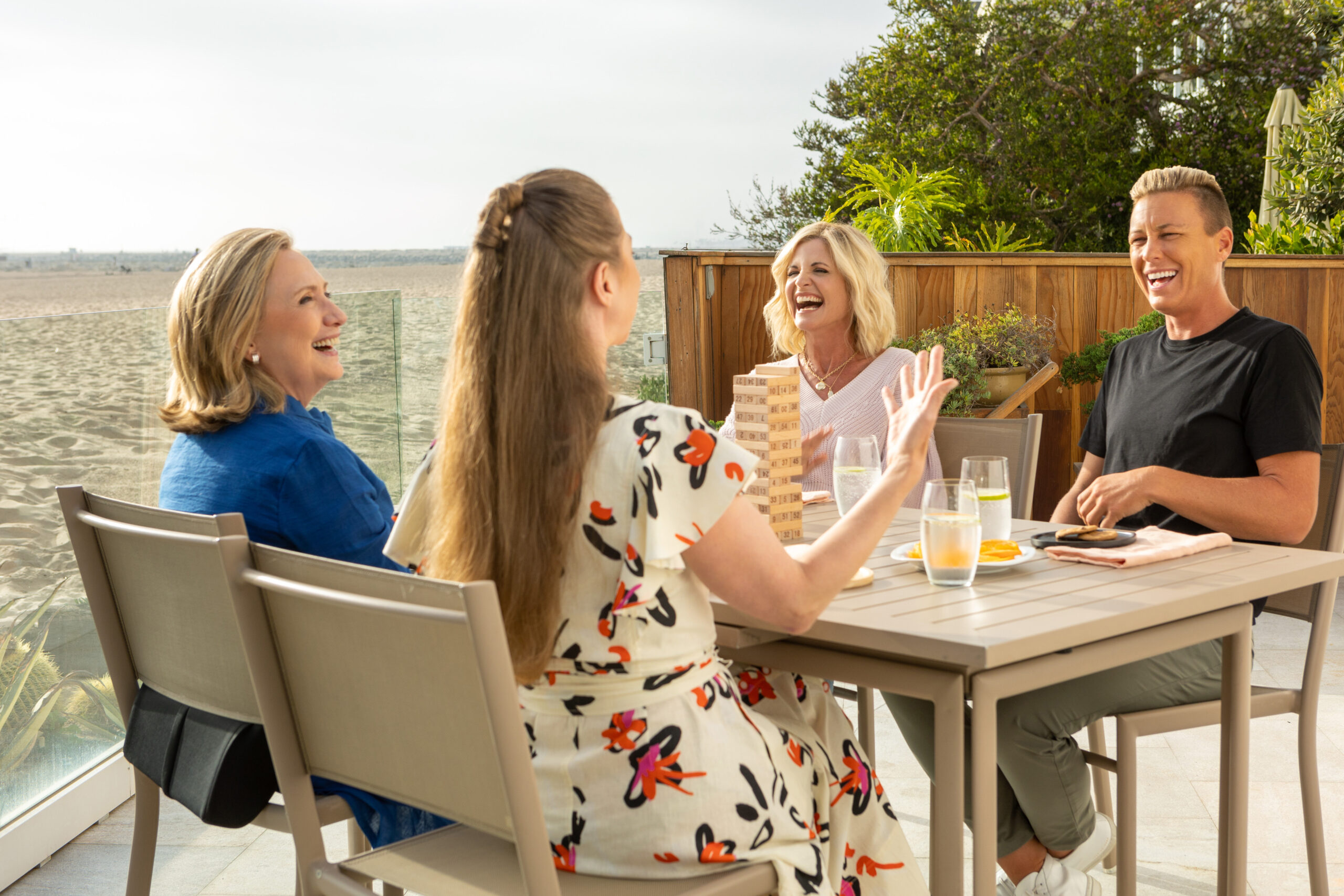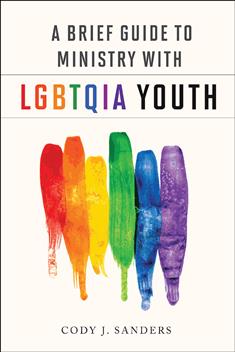In 2016, the Virginia-born Christian “mommy blogger” Glennon Doyle was raising three children, married to her husband Craig and promoting her second memoir—an Oprah Book Club selection—in Chicago when she met the woman who would become her wife.
Recognized for her frank, incisive examination of her rocky first marriage and soul-baring essays that plumbed the depths of her personal life, including struggles with anxiety, drug addiction and bulimia, Doyle had corralled a faithful fanbase who were sure to be surprised by her next confession.
In her book Untamed, Doyle, raised Catholic and known for her blog posts on parenting and Jesus, describes meeting her soon-to-be spouse Abby Wambach, the champion women’s soccer icon (and Catholic high school graduate). “Suddenly, a woman is standing where nothingness used to be,” writes Doyle. “My whole being says: There She Is.”
Doyle and Wambach are just two of the several LGBTQ women of faith, or of religious upbringing, profiled in the new Apple TV+ docuseries Gutsy. Co-produced by Hillary and Chelsea Clinton and inspired by their 2019 project The Book of Gutsy Women, this eight-part examination of rebellious, trailblazing women dedicates much-needed space and time to the stories of unexpected queer partnerships and their often messy intersections with questions of faith.
“I had a faith-based life and a career that was largely based on that,” said Doyle to the Clintons, who traveled abroad and across the country to interview their film subjects. “I was told over and over again: ‘You can pursue this [relationship with Wambach], but it will be the end of your career.”
Christian backlash ensued, with some faulting “this problematic woman” as part of the world’s “false teachers” and “agents of Satan” who labor to confuse the People of God. “When you abandon Jesus as your cornerstone, you crumble until you’re so blinded that you cannot think straight and are filled with all manner of evil,” wrote one commentator in 2016. “I pray [she] repents.”
But Doyle’s career survived, as did her union with the woman she married in 2017. Untamed, released in 2020, was a New York Times bestseller and has been optioned for television.
Gutsy also profiles the Rev. Whittney Ijanaten, an Ohio-born Christian officiant for LGBTQ weddings and chaplain at U.C.L.A. Health in Los Angeles. Rev. Whittney, who earned a master’s degree in theology from the Christian Theological Seminary in Indianapolis and describes herself as a Black queer minister, discussed her childhood in a charismatic Pentecostal community.
“Hold up. So you mean to tell me ‘God is love,’ but God don’t love me?” asked Rev. Whittney, calling her past faith tradition “anti-everything I am.” Rejecting this notion, she adopted a theology of hospitality whose motto is one of radical inclusion: “There’s a seat at the table, at my table, for you.”
Here, Rev. Whittney suggests an important point: In many ways, the married lives and sexual practices of LGBTQ people have endured similar unending (and unwarranted) scrutiny, both from religious institutions and secular society. Even Pope Francis, in a precedent-breaking 2013 interview with America and other international Jesuit publications, said the church must not “insist only on issues related to … gay marriage” and that “pastoral ministry cannot be obsessed with the transmission of a disjointed multitude of doctrines.”
“This eight-part examination of rebellious, trailblazing women dedicates much-needed space and time to the stories of unexpected queer partnerships and their often messy intersections with questions of faith.”
The docuseries also spotlights an underrepresented community even within LGBTQ circles: widows.
In a roundtable discussion with women who lost their spouses, Grace Villafuerte, a widowed lesbian and vice president of Sonoma County Pride in California, talks about coming out during the passage of the Defense of Marriage Act, a 1996 law enacted during the Clinton administration that defined marriage in the United States as a union between one man and one woman. (The law was later overturned by the Supreme Court.)
“I’m a good, law-abiding, immigrant, Catholic school kid,” said Villafuerte. “If the government says this … this must be how it should be.”
In an exclusive interview, Outreach asked the former Secretary of State and her daughter why they believed it was important to feature LGBTQ women in unique and sometimes complicated relationships.
“When we think about … what it means to be gutsy in life, relationships are at the core of that,” said Secretary Clinton. “And we couldn’t imagine doing a series that didn’t examine relationships.”
She was particularly interested in “people who had to escape their [religious] backgrounds” as their sexual orientations “made their lives complicated about who they could love and what was accepted.”
Chelsea Clinton agreed: “It was important for us to include … the spectrum of love and romantic relationships that provide so much meaning, not only to the women’s lives we feature in this episode of Gutsy, but hopefully in all of our lives.”
Outreach also asked the former Secretary, who explained the need for a faith “grounded in our commonality,” what she hoped to achieve by providing a platform for LGBTQ women to tell their stories. Referencing the intersections between the “faith world and the LGBTQ world,” she praised Rev. Whittney as a queer woman living her faith in public and spoke about the impact of Glennon Doyle’s experience.
“[Doyle’s] journey, which has such resonance with so many millions of people, particularly women, is one that always inspires me,” said Secretary Clinton. “And the way that she and Abby found each other, fell in love … [and] created this life that they are modeling I think will inspire a lot of our viewers who may not have ever thought about that.”
While she is keen to highlight the stories of queer women, Secretary Clinton has a complex political record on LGBTQ civil rights. During her 2008 presidential bid, she was criticized by Democratic colleagues (and placed at odds with her daughter) for not supporting same-sex marriage. She did, however, voice support for same-sex civil unions. Her White House campaign ended in a defeat to then-Chicago Senator Barack Obama, who saw gay marriage legalized nationwide by the Supreme Court during his second term as president.
As Clinton and her daughter are prominent figures in every episode—relaying family stories, dissecting their personal lives, visiting their former Arkansas home—much of the viewer’s enjoyment of this series will depend on their undoubtedly strong opinion of the most famous family in contemporary American political history, save for the Kennedys.
The Clintons are, at once, imitated and parodied, beloved and reviled, admired and scorned, depending on whom you dare ask. Consider them inkblots in a Rorschach test: What you see is an interpretation. Hillary Clinton herself is the endlessly-discussed subject of more than 100 books, dozens of scholarly articles and a head-spinning (or head-scratching) litany of internet conspiracy theories.
During the fourth episode, an interview with Rev. Whittney flips tables when she asks the former First Lady about her own marriage, a union examined, criticized, probed and litigated in the public eye for decades. In the late 1990s, President Bill Clinton’s extra-marital affair was tabloid fodder and the subject of countless late-night TV punchlines, putting questions about inappropriate presidential influence, the Clintons’ hyper-public marriage and America’s Puritan-inspired sexual preoccupations under a high-power microscope.
The elder Clinton engages in a genuine and notably vulnerable discussion about her reasons for remaining married, hinting that she would rather have not known about her husband’s indiscretions, and we know that somewhere a viewer nods their head in agreement, another person rolls their eyes and Newt Gingrich screams at his television set.
Chelsea Clinton: “It was important for us to include … the spectrum of love and romantic relationships that provide so much meaning, not only to the women’s lives we feature in this episode of Gutsy, but hopefully in all of our lives.”
Some viewers will see this as a vanity project, a megabudget reinvention that casts this mother-daughter duo as a benign Laverne and Shirley act. (They were roommates, I know.) Just recently, documentarian Laura Poitras, whose portrait of photographer Nan Goldin won the top prize at Venice this year, criticized film festivals for “whitewashing” the Clintons by screening their film projects.
“Hillary Clinton was actively involved in the wars and occupations in Iraq and Afghanistan,” said Poitras. “Hard questions should be asked.”
Gutsy is not a Mike Wallace-style interrogation of Hillary Clinton’s political record or moral judgments. She’s had enough of that in the media and on Capitol Hill. But Clinton and her daughter are also not the main focus of Gutsy, an entertaining, educational and often surprising glimpse into the lives of both internationally famous women (Jane Goodall, Goldie Hawn, Wanda Sykes) and lesser-known pioneers, all of them with perspectives to share and stories to tell.
Especially valuable are the perspectives of queer women of faith in this docuseries, women embraced by Christ but often misunderstood by heterosexual society and sidelined, in too many ways, by the institutional church.
“With Abby and Glennon,” said Chelsea Clinton during the interview, “there is so much joy that is just all-embracing for anyone who’s in their presence. And so we hope that not only can the love be respected as universal, [but] also that the joy can be respected as universal.”



